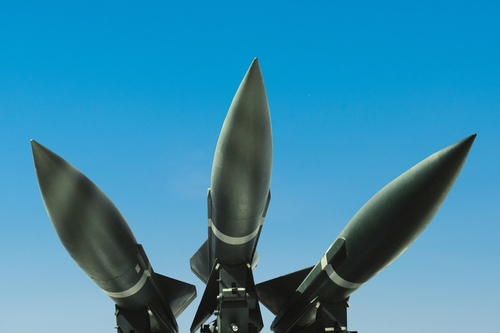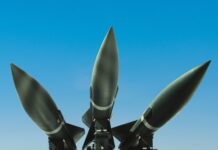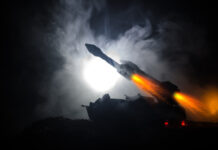
In a late-night incident on Tuesday, Syrian air defenses intercepted Israeli missiles targeting the port city of Tartous, a significant coastal hub that houses Russia’s only Mediterranean naval base. Reports of explosions rocked the region, igniting concerns of further escalation amid ongoing tensions in the area. This marked one of the rare Israeli attacks on Tartous, as Israel's military actions typically focus on the Damascus area. The missile strikes took place shortly before midnight, Syrian state media confirmed, and were aimed at infrastructure suspected of supporting Hezbollah and Iranian operations in the region.
Tartous is not only a Syrian stronghold but also home to critical Russian military assets. The city’s proximity to Lebanon and the presence of Russian naval forces generally make it an unusual target for Israeli operations. Yet, the increased presence of Iranian-backed groups in Syria, particularly in coastal provinces like Tartous, has raised concerns for Israeli defense officials. The strike comes amid Israel’s broader campaign against Iran’s military foothold in Syria, aimed at curbing Hezbollah’s influence and the smuggling of advanced weaponry to the group.
TERRORISTS WERE ABOUT TO SEND CRUISE MISSILES TO ISRAEL TO KILL INNOCENT CIVILIANS BUT ISRAEL ENDED ITS PURSUIT OF EVIL pic.twitter.com/qKCwB7IjB2
— MASHIAHIYIM QODESHIM TALMIDIM (@AlvesPedro57992) September 23, 2024
This attack is the fifth one attributed to Israel on Syrian territory in the last two months, further highlighting the ongoing shadow war between Israel and Iranian proxies within Syria. While Syrian state television mentioned that several missiles were intercepted, the specifics of the damage and whether key Iranian installations were struck remain unclear. Syrian casualties from the incident included two soldiers killed and several others wounded, according to Syrian sources. The strikes reportedly triggered significant explosions, although the Syrian government has not released detailed information on the targets.
Israel’s increased activity in Syrian airspace, particularly targeting Iranian-linked sites, is part of a larger regional strategy to thwart Hezbollah’s access to advanced weaponry. Israeli Defense Minister Yoav Gallant recently emphasized the urgency of preventing Hezbollah from enhancing its military capabilities, particularly with Iranian assistance. For years, Israeli strikes in Syria have largely concentrated on Iranian targets, while avoiding direct confrontation with Russian assets. The latest attack in Tartous, however, shows a shift, as Israeli strikes inch closer to areas with Russian military presence.
Lebanon right now due to heavy isreali missiles , rockets nd bomb strike on it.#Hezbollah #iran #hamas #MiddleEast #Nasrallah #isreal #Lebanon #LebanonExplosion #Beirut #haifa #LebanonBlast pic.twitter.com/cylTFVUvG9
— Geography🌏🏞️ (@GeoStatics7372) September 23, 2024
Syria’s alliance with Hezbollah and Iran plays a crucial role in the ongoing conflict, as both nations support President Bashar al-Assad’s government. However, Russia’s involvement in the region complicates the situation, as Moscow maintains a cautious stance on direct conflict with Israel while still supporting its Syrian and Iranian allies. Russian officials have not commented on the Tartous attack, but tensions remain high, with both Israeli and Russian forces operating in close proximity.
Meanwhile, the geopolitical landscape around Tartous is becoming increasingly volatile, as Tehran continues to exploit Syrian territory for strategic purposes. Iran has steadily ramped up its military presence in Syria, with weapons shipments and personnel deployments designed to strengthen Hezbollah’s position in Lebanon. Iranian-aligned militias have also used Syria as a base to launch attacks against Israeli interests. In response, Israel has conducted hundreds of airstrikes in Syria in recent years, many of which aim to dismantle Iranian military infrastructure and prevent the transfer of advanced arms to Hezbollah.
The Tartous strike comes as Israel is deeply engaged in southern Lebanon, where it is conducting operations against Hezbollah. With over 500 Lebanese deaths reported in recent clashes, the risk of a wider regional conflict looms large. Israeli officials fear that Hezbollah’s involvement could draw in other Shia militias from Iraq and Syria, further destabilizing the region. Additionally, Iranian rhetoric has intensified, with some leaders calling for a broader coalition of forces to resist Israeli actions in Lebanon and Syria.
In the wake of this latest strike, the possibility of further escalations between Israel, Syria, and Iran remains. As Israeli forces continue to target Iranian proxies in the region, including in strategic locations such as Tartous, the risks of miscalculation grow, particularly given the proximity of Russian military assets.













You go Bibi. Kill them all, MUSLIMS.